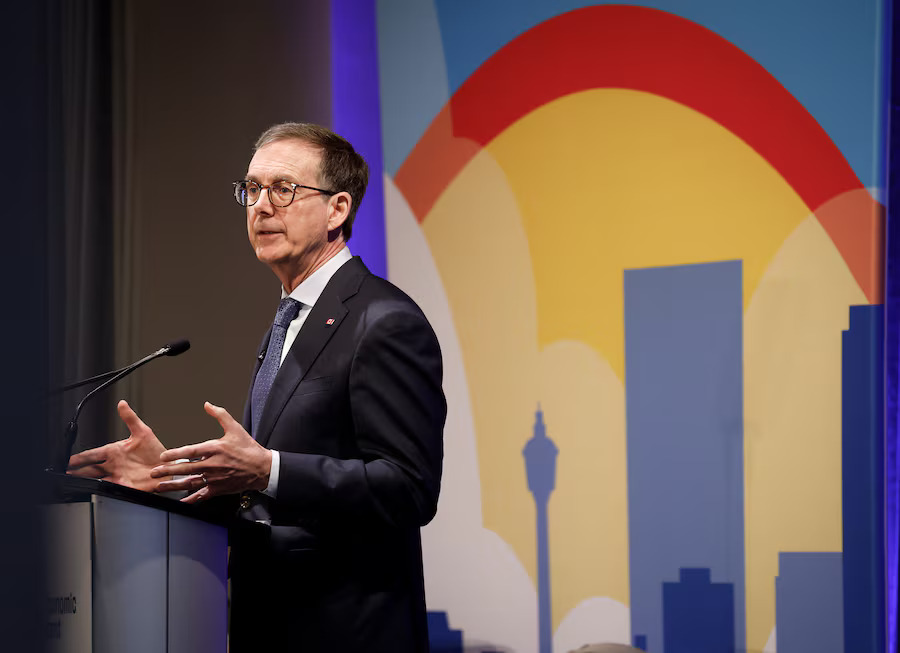Business
Bank of Canada unveils new playbook as Trump’s tariff threats create mayhem
- byadmin
- March 21, 2025
- 0 comment
- 1 minute read
- 4330 Views
The Bank of Canada is adjusting how it conducts monetary policy to navigate the massive uncertainty caused by U.S. President Donald Trump’s erratic tariff threats, Governor Tiff Macklem said Thursday.
In a speech in Calgary, Mr. Macklem said the central bank will focus on minimizing risks when setting interest rates, rather than trying to figure out an optimal path for monetary policy based on muddy economic forecasts.
“If we were to guess where the economy is heading and make policy to optimize that outcome, we’d risk getting it wrong. Our actions could be ineffective or even make the outcome worse,” Mr. Macklem said, noting that U.S. tariff policy is in flux and the impact of a trade war on inflation and economic growth in Canada remains highly uncertain.
“We need to set policy that minimizes the risk. That means being less forward-looking than normal until the situation is clearer. And it may mean acting quickly when things crystallize. We need to be flexible and adaptable,” he said.
Last week, the central bank cut its benchmark policy rate for the seventh consecutive time, to 2.75 per cent, but warned it would “proceed carefully” with future changes. Mr. Macklem reinforced that hawkish message on Thursday, saying that the bank needs to remain focused on controlling inflation, even as a trade war ripples through the economy, hurting businesses and killing jobs.
Opinion: The BoC rate cut is a penalty for savers and a gift for people with variable-rate mortgages
“We know that some prices will rise when the tariffs hit – that’s not something monetary policy can stop. What monetary policy can – and must – do is prevent those initial, direct price increases from spreading,” Mr. Macklem said. “Simply put, we need to make sure that a tariff problem doesn’t become an inflation problem.”
The U.S. President’s aggressive use of tariffs has created a “new economic crisis” for Canada, Mr. Macklem told the Calgary audience. However, it’s far from clear how a trade war will play out.
Mr. Trump placed blanket tariffs on all Canadian goods, but then offered a month-long reprieve for products that comply with the continental free trade agreement. He has also placed tariffs on steel and aluminum and threatened unspecified “reciprocal” tariffs that will supposedly come into force on April 2.
This back-and-forth and pervasive uncertainty means it’s almost impossible to do economic forecasting, Mr. Macklem said. “It’s very hard for any of us on Governing Council to have high conviction about the most likely outcome. Several outcomes can all look plausible.”
If Mr. Trump backs away from his most serious tariff threats and Canada and the U.S. can agree on ways to address various trade grievances, the Canadian economy could pick up smartly and the risk of inflation dissipate. But if high and broad-based tariffs are applied and remain in place for an extended period of time, “that could very well lead to a recession,” Mr. Macklem said in a press conference after the speech.
More stories below advertisement
A major unknown is how retaliatory tariffs on U.S. goods, supply chain disruptions and a depreciation of the Canadian dollar will feed through into inflation in Canada. This depends on variables like consumer and business behaviour, and how much demand there is in the economy.
“The more inflationary the impact, the less scope monetary policy has to support the economy. Instead, it needs to put more focus on anchoring inflation expectations, which risk drifting up when inflation rises more and more quickly,” Mr. Macklem said.
The latest inflation numbers, published this week, showed a surprisingly large jump in headline Consumer Price Index inflation in February, to 2.6 per cent from 1.9 per cent the month before. That was largely driven by the end of the federal tax holiday, which had lowered the inflation rate for several months. But some measures of core inflation also pushed higher, suggesting price pressures are building in the economy.
“At this point, it hasn’t fundamentally changed our view…but it has got our attention,” Mr. Macklem said of the latest inflation data. He said the bank still expects the inflation rate to be around 2.5 per cent in March.
Financial markets expect the bank to hold interest rates steady at the next meeting in April, according to LSEG data. Traders are pricing in only two more quarter-point rate cuts this year, which would take the policy rate to 2.25 per cent.
“An environment where the Bank of Canada is going to put more weight on realized data and less weight on forward-looking impacts from trade policy is an unambiguously hawkish shift in the current context,” Andrew Kelvin, head of Canadian and global rates strategy at Toronto-Dominion Bank wrote in a note to clients following the speech.
“Ultimately, we believe that the damage wrought by trade disruptions will warrant additional easing this year, and we are going to continue to hold our 2 per cent terminal rate forecast for July. Certainly though, between the February CPI data, the March BoC interest rate announcement, and today’s speech, the odds of a pause somewhere along the way to 2 per cent does seem to be rising,” Mr. Kelvin said.
Trade wars are tricky for central banks because they hurt economic growth but also push up prices. That forces central bankers to choose between cutting interest rates to support the economy, and holding them steady or raising them to head off inflation.
Even before Mr. Trump’s tariffs actually hit exporters, they are hurting business and consumer confidence and weighing on the Canadian economy. A survey conducted by the central bank last month showed that consumers are worried about losing their jobs and planning to spend less, while businesses are putting a freeze on hiring and pausing investments.
“The Canadian economy managed a soft landing,” Mr. Macklem said, noting that the inflation surge that followed the pandemic had been seen off without the economy falling into a recession. “Unfortunately, we’re not going to stay on the tarmac for long.”
Powered by Froala Editor




